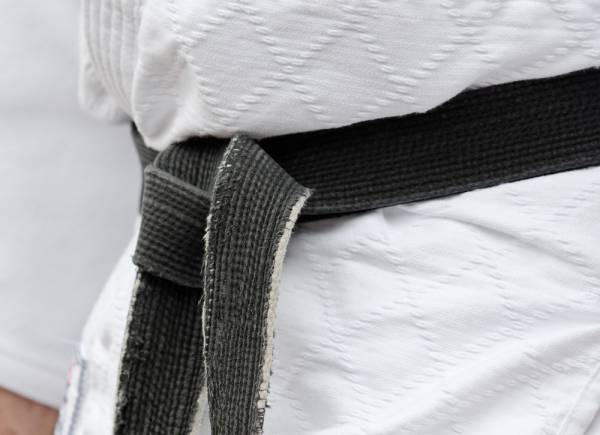In an earlier article, I enumerated some rights I believe every grappler should be able to enjoy in his or her academy. As I mentioned in that article, however, there are no rights without attendant responsibilities: the behaviors and beliefs we grapplers must embody to ensure we are upholding our end of the bargain. Following are five responsibilities I believe every grappler should fulfill.
The Responsibilities of a BJJ Student
1. You are responsible for using common sense – and your manners.
When children are being taught appropriate behavior (e.g., a parent prompts his or her child with “What do you say?” when Grandma and Grandpa fork over a birthday present) the ultimate goal is to ingrain that behavior in the child so it becomes automatic. Thus are created mannerly adults. As a grappler, you have the responsibility to use your manners at all times. Yes, BJJ is a combat sport, but even Fight Club has rules (and I am breaking the first and second ones to make a point).
Say please and thank you. Refrain from speaking (or whispering to your neighbor) when the instructor is teaching. Interact with instructors and students appropriately, especially ones you don’t know well, (e.g., it is highly unlikely that the instructor is your bro, so find a more polite way to refer to him or her. Especially her.) Wash your gi and yourself between training sessions. If you have ringworm or staph, stay off the mat. (Don’t do like a guy I know and wrap athletic tape around and around your neck/throat to cover up a raging ringworm infection and then pretend you don’t understand when people ask you why you look partially mummified.)
In other words, police yourself. If you don’t, you will be forcing someone to pull rank, and most of the high-level grapplers I know and respect actually don’t like to do that. They seem to prefer that everyone simply demonstrate common sense and manners. As a handy litmus test, if you think you are being treated like a second-class citizen, per my comments in the earlier article that you shouldn’t have to feel that way, take a minute before you do anything else to ask yourself honestly if you are acting like one.
2. You are responsible for becoming enculturated as quickly as you can.
Manners and common sense will get you started, but it’s fair to say that some conventions will be unique to the grappling context, and further that they may differ from academy to academy. For instance, some academies require that everyone bow to the center of the mat before stepping on it, while others are more casual. At first, you may not even know what questions to ask because you don’t yet know what you don’t know. This is understandable and to be expected, and in this case, your intentions can go a long way.
That being said, the best way to learn is to pay attention. Look for behavior patterns common to the group, common to your belt rank, common to people interacting with the instructor(s) and high-ranking guests. Don’t see lower belts asking higher belts to roll? Then don’t do it yourself unless and until you find out whether it is acceptable. Notice everyone turning to face the wall to fix their gis and tie their belts? Then you should be doing it too. Observe. Intently and carefully. If you are already a seasoned grappler and are familiar with the mores at your own school, this still applies when you train elsewhere.
 As I mentioned, different academies will have different rules, but here’s one I’m willing to bet is applicable most anywhere: Do not compliment the jiu jitsu of or give advice to a higher-ranked belt. I’m honestly not saying this for me specifically, but rather because nobody wants to deal with an uncomfortable situation. And trust me that a blue belt commenting to a brown belt, “Hey, your guard is coming along nicely!” or “That was great, the way you capitalized on my mistake,” or even, “Nice job” is squirm-inducing for many reasons. If you are impressed with the movement of someone who outranks you, tell your diary. Face-to-face with that person, however, just remember your manners (e.g., “Thank you for the roll.” Period. Handshake/bow combo. Then move on.)
As I mentioned, different academies will have different rules, but here’s one I’m willing to bet is applicable most anywhere: Do not compliment the jiu jitsu of or give advice to a higher-ranked belt. I’m honestly not saying this for me specifically, but rather because nobody wants to deal with an uncomfortable situation. And trust me that a blue belt commenting to a brown belt, “Hey, your guard is coming along nicely!” or “That was great, the way you capitalized on my mistake,” or even, “Nice job” is squirm-inducing for many reasons. If you are impressed with the movement of someone who outranks you, tell your diary. Face-to-face with that person, however, just remember your manners (e.g., “Thank you for the roll.” Period. Handshake/bow combo. Then move on.)
3. You are responsible for owning your training.
In recent months and years, I have heard other people here and there mention the importance of owning your training, and it makes me happy for two reasons. First, I’m pretty sure I coined the phrase. At least, I never heard it before I started saying it myself. Second, and more importantly, to my mind owning our training is the single most important thing we can do as grapplers. As people, even, we have to own our sh*t.
So what does this mean, practically speaking? Well, here’s how I think about it: When I own my training, I regularly check myself by considering the following questions and making sure I’m clear in my mind about the answers: 1) What do I want in my training? What do I want to accomplish, how do I want to feel, what are my main priorities? 2) Which of the factors that are within my control can I manipulate to help me get what I want? (Emphasis on “within your control.” In other words, what can I do? Not, how do I get this other person to change?) 3) Of these factors that are within my control, which ones am I willing to modify and assume the consequences for? Of course, implementation is frequently not as tidy as these questions make it sound, so in a future article I will go into more detail about this.
4. You are responsible for always remembering that your instructor is a person, not to be idolized or demonized, and acting accordingly.
Even people who are the absolute best at what they do are still people. Your instructor may be a black belt in BJJ (and therefore, of course, entitled to all due respect), but he or she is not a black belt in everything, particularly not in your life. This means you do not get to turn your brain off and just follow blindly. You should always be filtering every message through your own value system to make sure you are always making choices you own yourself, not pawning the responsibility off on someone else. Any instructor or coach with integrity would not have a problem with this and in fact would likely welcome and even advise it.
 Ideally, your instructor will be a skilled technician and an effective and invested teacher and coach, and you will be similarly invested and eager to learn. But it is vital to be clear in your mind about the nature and extent of your relationship to your instructor so you can maintain healthy boundaries. Grapplers spend a lot of time together training, socializing, and navigating intense interactions that by their nature contain elements of physicality and aggression. Some students develop personal relationships and friendships with some instructors, which can make things more complicated. In concert with owning your training, then, make sure you understand where your instructor’s responsibilities and influence should begin and end, as well as the nature of your relationship(s) with him or her. Leave the hero worship and the blame elsewhere.
Ideally, your instructor will be a skilled technician and an effective and invested teacher and coach, and you will be similarly invested and eager to learn. But it is vital to be clear in your mind about the nature and extent of your relationship to your instructor so you can maintain healthy boundaries. Grapplers spend a lot of time together training, socializing, and navigating intense interactions that by their nature contain elements of physicality and aggression. Some students develop personal relationships and friendships with some instructors, which can make things more complicated. In concert with owning your training, then, make sure you understand where your instructor’s responsibilities and influence should begin and end, as well as the nature of your relationship(s) with him or her. Leave the hero worship and the blame elsewhere.
5. You are responsible for respecting the priorities and expectations of your chosen academy.
The fact that different academies will have different rituals and traditions foreshadows and underscores the fact that different academies will also have different offerings and different emphases. Some academies will have mixed martial arts classes in addition to grappling, for instance, while some will be competition focused, and so on and so forth. This means it is your job to be aware of the priorities and emphases for this particular academy and make sure they are aligned with your own. And if that alignment ever shifts to a point where you are dissatisfied with it, it is your responsibility to act accordingly. This means deciding whether you can abide, a la the Dude, or whether you need to find a new environment.
Note this does not mean trying to change the current environment. This is your instructor’s rodeo. If he or she decides there won’t be clowns, you have to be okay with no clowns as long as you decide to attend. But if your need for clowns eventually becomes unbearable, it’s time to find a different, clown-rich rodeo, not to hire clowns for this one. It’s probably inevitable that you will in some way change your stance on clowns at some point in your grappling career. You just have to be honest about it. If you can live without the clowns even though you want them, acknowledge that’s what you’re doing and accept it without grudge. If you can’t, be forthright and respectful to your instructor(s) if and when you decide to move on.
What do you think about the five grappler responsibilities I’ve enumerated here? Do you agree with them? Would you impose others? Post your opinions to comments.
Make sure you also read The Rights of a BJJ Student.
Photos courtesy of Shutterstock.






